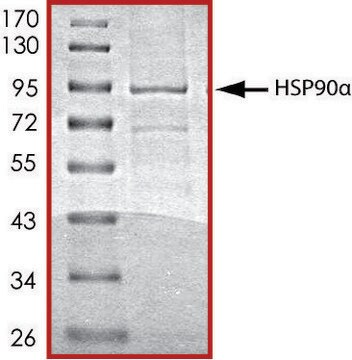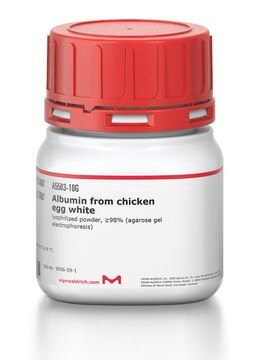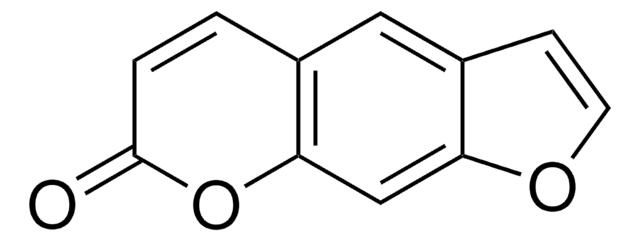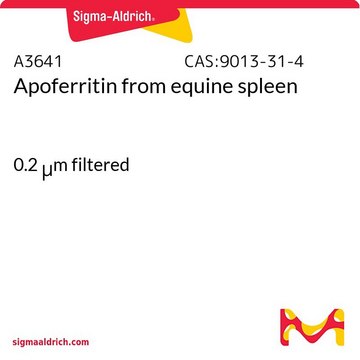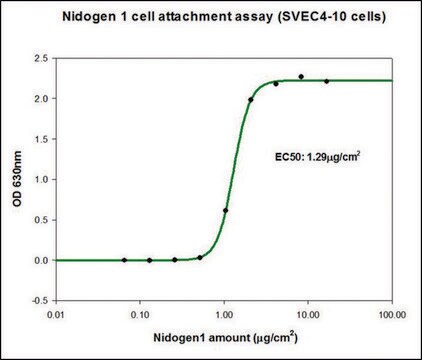추천 제품
생물학적 소스
human
재조합
expressed in E. coli
분석
≥70% (SDS-PAGE)
양식
buffered aqueous glycerol solution
분자량
~37 kDa
NCBI 수납 번호
응용 분야
cell analysis
배송 상태
dry ice
저장 온도
−70°C
유전자 정보
human ... PCNA(5111)
일반 설명
PCNA (proliferating cell nuclear antigen) gene is mapped to human chromosome 20p12.3 and encodes a scaffolding protein. PCNA is a homotrimeric protein known to localize in the nucleus. The PCNA ring has a central cavity that is large enough to allow the dsDNA to slide freely along it. PCNA is a nuclear protein whose appearance correlates with the proliferative state of the cells and is a cofactor of DNA polymerase delta.
생화학적/생리학적 작용
Proliferating cell nuclear antigen (PCNA) significantly maintains the longevity of mature neutrophil granulocytes. Upregulation of the PCNA gene is observed in cervical squamous cell carcinoma. PCNA supports cell survival by elevating metabolism flux. PCNA expression is known to offer resistance to chemotherapy. PCNA is a homotrimer and helps increase the processivity of leading strand synthesis during DNA replication. In response to DNA damage, PCNA is ubiquitinated and is involved in the RAD6-dependent DNA repair pathway. Immunofluorescence studies have shown that p300 may play a role in DNA repair synthesis through its interaction with PCNA. In vitro and in vivo p300 forms a complex with PCNA that does not depend on the S phase of the cell cycle and stimulates DNA synthesis in vitro. PCNA interacts with the Williams syndrome transcription factor (WSTF) allowing it to target to DNA replication foci, that then allows recruitment of SNF2H.
물리적 형태
Supplied in 50mM sodium phosphate, pH 7.0, 300mM NaCl, 150mM imidazole, 0.1mM PMSF, 0.25mM DTT, 25% glycerol.
제조 메모
after opening, aliquot into smaller quantities and store at -70 °C. Avoid repeating handling and multiple freeze/thaw cycles
신호어
Danger
유해 및 위험 성명서
Hazard Classifications
Eye Irrit. 2 - Repr. 1B - Skin Irrit. 2
Storage Class Code
6.1C - Combustible acute toxic Cat.3 / toxic compounds or compounds which causing chronic effects
WGK
WGK 1
Flash Point (°F)
Not applicable
Flash Point (°C)
Not applicable
가장 최신 버전 중 하나를 선택하세요:
Proliferating cell nuclear antigen prevents trinucleotide repeat expansions by promoting repeat deletion and hairpin removal
Beaver JM, et al.
DNA Repair, 48(2), 17-29 (2016)
Cytoplasmic proliferating cell nuclear antigen connects glycolysis and cell survival in acute myeloid leukemia
Ohayon D, et al.
Scientific reports, 6(3), 35561-35561 (2016)
Raymond A Poot et al.
Nature cell biology, 6(12), 1236-1244 (2004-11-16)
Chromatin states have to be faithfully duplicated during DNA replication to maintain cell identity. It is unclear whether or how ATP-dependent chromatin-remodelling factors are involved in this process. Here we provide evidence that the Williams syndrome transcription factor (WSTF) is
Mutations at multiple CDK phosphorylation consensus sites on Cdt2 increase the affinity of CRL4Cdt2 for PCNA and its ubiquitination activity in S phase
Nukina K, et al.
Genes Cells, 23(3), 200-213 (2018)
S Hasan et al.
Nature, 410(6826), 387-391 (2001-03-27)
The transcriptional coactivator p300 interacts with many transcription factors that participate in a broad spectrum of biological activities, such as cellular differentiation, homeostasis and growth control. Mouse embryos lacking both p300 alleles die around mid-gestation, with pleiotropic defects in morphogenesis
자사의 과학자팀은 생명 과학, 재료 과학, 화학 합성, 크로마토그래피, 분석 및 기타 많은 영역을 포함한 모든 과학 분야에 경험이 있습니다..
고객지원팀으로 연락바랍니다.
